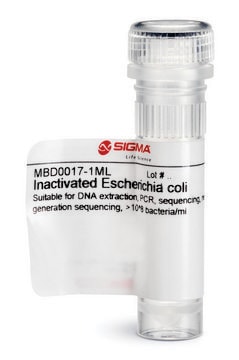EC11303
Escherichia coli
Strain B, lyophilized cells
Synonym(s):
E. coli
Sign Into View Organizational & Contract Pricing
All Photos(3)
About This Item
Recommended Products
Quality Level
sterility
non-sterile (not processed or packaged aseptically)
form
lyophilized cells
suitability
not intended for starter culture
storage temp.
−20°C
Looking for similar products? Visit Product Comparison Guide
Related Categories
General description
Escherichia coli is a non-pathogenic, facultative anaerobic flora present in the intestine of human. It belongs to the genus, Escherichia, which consists of motile gram-negative bacilli.
Application
Escherichia coli has been used:
- in the isolation of DNA from lyophilized cell
- in the preparation of crude cell lysate for developing scalable purification method for recombinant protein A
- as test proteome for comparative electrophoresis
Storage Class Code
11 - Combustible Solids
WGK
WGK 3
Flash Point(F)
Not applicable
Flash Point(C)
Not applicable
Personal Protective Equipment
dust mask type N95 (US), Eyeshields, Gloves
Choose from one of the most recent versions:
Certificates of Analysis (COA)
Lot/Batch Number
Don't see the Right Version?
If you require a particular version, you can look up a specific certificate by the Lot or Batch number.
Already Own This Product?
Find documentation for the products that you have recently purchased in the Document Library.
Diarrheagenic Escherichia coli
Nataro JP and Kaper JB
Clinical Microbiology Reviews, 11(1), 142-201 (1998)
Severe atopic dermatitis is associated with a high burden of environmental Staphylococcus aureus
Leung AD, et al.
Clinical and Experimental Allergy, 38(5), 789-793 (2008)
Horizontal comparative fluorescence two-dimensional gel electrophoresis for improved spot coordinate detection
Hanneken M, et al.
Electrophoresis, 35(8), 1118-1121 (2014)
Accelerated recombinant protein purification process development: Automated, robotics-based integration of chromatographic purification and analysis
Londo T, et al.
Journal of Chromatography A, 798(1), 73-82 (1998)
Marta Pacheco et al.
Mikrochimica acta, 189(5), 194-194 (2022-04-16)
Janus micromotors encapsulating transition metal dichalcogenides (TMDs) and modified with a rhodamine (RhO)-labeled affinity peptide (RhO-NFMESLPRLGMH) are used here for Salmonella enterica endotoxin detection. The OFF-ON strategy relies on the specific binding of the peptide with the TMDs to induce
Our team of scientists has experience in all areas of research including Life Science, Material Science, Chemical Synthesis, Chromatography, Analytical and many others.
Contact Technical Service







